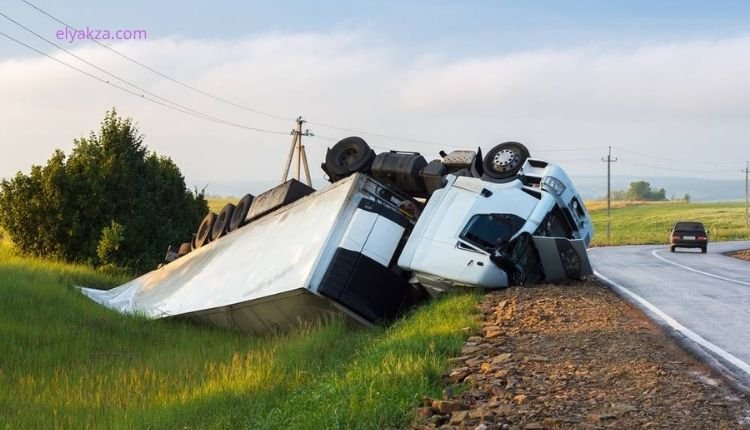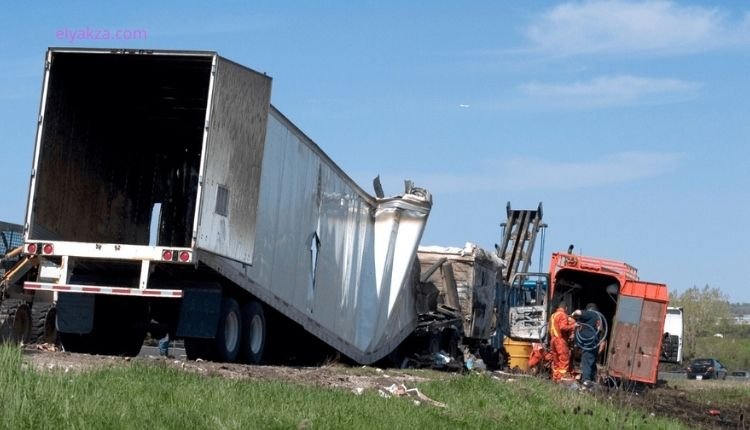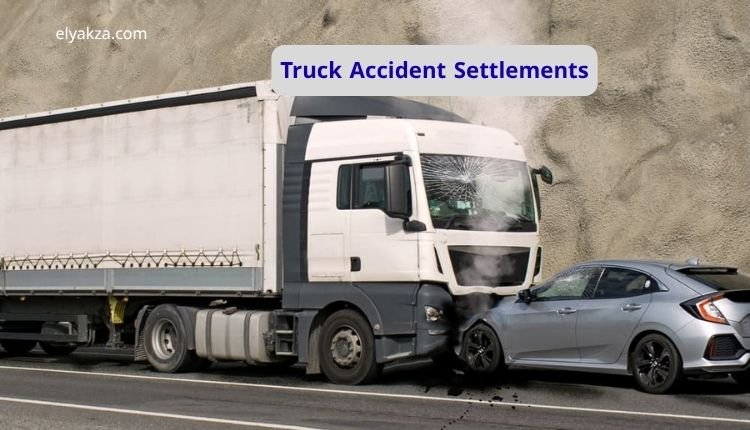Truck accidents are far more devastating than typical car collisions, often leading to severe injuries, extensive property damage, and life-altering consequences. If you or a loved one has been involved in a commercial truck accident, understanding the intricacies of truck accident settlements is crucial for securing the compensation you deserve. Unlike standard personal injury cases involving passenger cars, truck accident claims are complex, governed by unique regulations, and can involve multiple liable parties.
قائمة المحتويات
In 2021, a significant portion of top personal injury settlements, four out of ten according to TopVerdict.com, stemmed from truck accidents. This highlights not only the severity of these incidents but also the substantial financial impact they can have on victims. With thousands of commercial motor vehicle crashes occurring annually—38,149 in Texas alone in 2021, as reported by the Texas Department of Transportation—the need for comprehensive information on this topic is more pressing than ever. This guide will walk you through everything you need to know about pursuing truck accident settlements, from distinguishing these claims from car accidents to identifying responsible parties and the steps you should take post-collision.
Why Truck Accident Claims Are Different from Car Accidents
A personal injury claim arising from a commercial truck accident differs significantly from one involving a passenger car in several fundamental ways. These differences primarily stem from the nature of commercial trucking itself, which is subject to a different set of “rules of the road” and operational standards.
Firstly, the legal standards of care for commercial truck drivers are distinct. Driving a massive commercial truck requires a different skill set and adherence to stricter regulations than operating a passenger vehicle. This is due to the inherent dangers associated with their size, weight, and operational complexities.
Secondly, there are profound physical differences between commercial trucks and passenger cars that directly impact accident severity and legal considerations. These include:
- Height and Weight: Commercial trucks can weigh up to 30 times more than a typical passenger car, leading to catastrophic impact forces.
- Acceleration Time and Stopping Distance: Trucks require much longer distances to accelerate and stop, demanding specialized driving techniques and making sudden maneuvers difficult.
- Turn Radius: Their wide turn radius can create hazardous situations, especially in urban environments or tight corners.
- Trailer Dynamics: The presence of a trailer introduces additional complexities, such as jackknifing potential and load shifting issues.
- Number of Wheels: More wheels mean more points of contact and often different braking systems.
Finally, commercial truck drivers and their employers must comply with extensive training, licensing, and operational requirements that do not apply to regular drivers. Truck drivers must undergo rigorous training to obtain a Commercial Driver’s License (CDL) and are often required to perform pre-trip inspections of their vehicles—a task rarely undertaken by passenger car drivers. These inspections cover critical components like brakes, axle configuration, and other mechanical aspects vital for safe operation.
“Read Also: Navigating Commercial Truck Accident Claims“
Common Injuries Resulting from Truck Accidents

Due to the sheer size and weight disparity between commercial trucks and passenger vehicles, truck accidents frequently result in more severe and life-threatening injuries compared to typical car collisions. The kinetic energy involved in such crashes is immense, leading to devastating consequences for those in smaller vehicles.
Common injuries sustained in truck accidents that often lead to substantial truck accident settlements include:
- Traumatic Brain Injuries (TBIs): Ranging from concussions to severe brain damage, often with long-term cognitive and physical impairments.
- Spinal Cord Injuries: Leading to partial or complete paralysis, requiring lifelong medical care and assistive devices.
- Back and Neck Injuries: Including herniated discs, whiplash, and chronic pain syndromes.
- Broken Bones: Multiple fractures are common, often requiring surgery and extensive rehabilitation.
- Internal Organ Damage: Resulting from blunt force trauma.
- Burn Injuries: Especially in accidents involving fuel leaks or fires.
- Amputations: Severe crush injuries can necessitate limb removal.
These injuries not only entail significant medical expenses but also lead to lost wages, pain and suffering, and a diminished quality of life, all of which are considered when calculating truck accident settlements.
Frequent Causes of Truck Accidents
Truck accidents are rarely simple, single-factor events. They often result from a combination of human error, mechanical failure, environmental conditions, and sometimes, the negligence of multiple parties. Understanding the common causes is crucial for establishing liability in truck accident settlements.
These include:
- Driver Fatigue
- Distracted Driving
- Speeding
- Blind Spots
- Poorly Maintained Trucks
- Vehicle Malfunction/Tire Blowout
- Bad Weather Conditions
- Bad Road Conditions
- Wide Turns
- Driving While Intoxicated (DWI)
- Tailgating
- Trailer Jackknifing
- Unfamiliarity with the Road
- Aggressive or Reckless Driving
Beyond driver error, issues related to cargo can also cause accidents. Improper loading is a significant factor if the load is unsecured, too heavy, top-heavy, shifts during transit, or becomes dislodged.
Establishing Liability in Truck Accident Cases

To recover compensation for the harms and losses you’ve suffered in a truck accident, or to reach a successful truck accident settlement, you must first establish the truck driver’s (and potentially other parties’) liability for the accident. This involves a two-step process:
1. Establishing the Rules of the Road
You need to demonstrate the specific rules or standards of care that apply to commercial truck drivers. These rules can be found in various documents, including:
- Driver employee manuals
- Company policies and procedures
- Training materials
- Actual practices of the trucking company
Crucially, the Federal Motor Carrier Safety Act (FMCSA) establishes comprehensive rules that truck drivers and companies must follow to ensure safety on the roads. Violations of FMCSA regulations often serve as strong evidence of negligence.
2. Presenting Evidence of Rule Violation
Once the relevant rules are identified, you must present evidence that the truck driver’s failure to follow these rules caused the accident. Gathering robust evidence is paramount for strong truck accident settlements. This evidence may include:
- Crash Report
- Eyewitness Testimony
- Dashboard Camera Footage
- Electronic Logging Devices (ELDs) / Event Data Recorders (EDRs)
- Hours of Service Records
- Truck’s Route Log
- Driver’s Records of Duty
- Truck’s Maintenance and Repair Records
- Driver’s Qualifications File
- Driver’s Employment History
- Truck Driver’s Mobile Device Records
Who Can Be Held Responsible for a Truck Accident?
Unlike typical car accidents, where liability often rests solely with one driver, truck accidents frequently involve multiple parties who can be held responsible, either directly or indirectly. Identifying all potentially liable parties is key to maximizing truck accident settlements.
- The Truck Driver
- The Trucking Company: Including negligent hiring, training, or pressuring drivers to violate safety rules.
- Third-Party Vendors: Responsible for loading or maintaining the truck.
- The Truck Manufacturer or Parts Manufacturer
- Government Agencies: In cases involving poorly maintained roads or lack of signage.
Potential Compensation in Truck Accident Cases
The amount of money you can recover in truck accident settlements depends largely on the severity of the harms and losses you’ve suffered. Due to the catastrophic nature of these accidents, potential compensation can be substantial. Federal law mandates that commercial trucks engaged in interstate commerce carry insurance policies that cover at least one million dollars in damages.
Compensation typically covers:
- Medical Expenses
- Lost Wages
- Pain and Suffering
- Property Damage
- Loss of Consortium
- Punitive Damages (in rare, extreme cases)
Crucial Steps to Take After a Truck Accident
If you’ve been involved in a truck accident, your actions immediately following the incident can significantly impact your ability to pursue a successful truck accident settlement.
- Prioritize Your Safety and Seek Medical Attention
- Contact Law Enforcement
- Document the Scene:
- Damage to your vehicle and the truck
- The accident scene, including debris, skid marks, traffic signs, and road conditions
- The surrounding area from various angles
- Gather Witness Information
- Do Not Admit Fault or Discuss Details
- Avoid Social Media
- Consider Hiring a Personal Injury Attorney
Truck Accident Settlements: the Conclusion
Navigating the aftermath of a truck accident can be overwhelming, but understanding your rights and the complexities of truck accident settlements is your first step towards recovery. These cases are distinct from standard car accidents, involving unique regulations, severe injuries, and often multiple liable parties.
From the moment of impact, every decision you make can influence the outcome of your claim. By prioritizing your health, meticulously documenting the incident, and seeking expert legal guidance, you significantly increase your chances of securing the just compensation needed to rebuild your life. Don’t face the powerful trucking companies and their insurance adjusters alone; a qualified legal professional can be your strongest advocate.
John George is a professional writer focused on legal advice and attorney guides, offering practical and easy-to-understand content that helps readers navigate complex legal topics. His work covers various areas such as contracts, business law, family law, and consumer rights, always aiming to simplify legal concepts for everyday readers.
Through his articles, John provides step-by-step guides, insightful tips, and detailed explanations that empower readers to make informed decisions when dealing with legal matters. He bridges the gap between legal professionals and individuals seeking clarity in their legal journey.
John is committed to promoting accessible legal knowledge and believes that everyone deserves reliable information to protect their rights. His writing style combines professionalism with clarity, making his work a valuable resource for both individuals and small businesses.

